Our Location
Behind BSES Rajdhani Power Station, Katwaria Sarai
Delhi 110016
Celebrate this Holi with us and enjoy an instant booking discount!
Get 15% OFF on all bookings!
In vitro fertilization, or IVF, is a type of reproductive technique in which the sperm and eggs are mixed outside the human body to form embryos and then implanted inside the uterus. In Delhi, it runs between Rs. 1.2 lakh and Rs. 1.6 lakh per cycle and is mostly used for unexplained blocked tubes or infertility. Using donor or own eggs, a guaranteed IVF program allows multiple attempts at an increased success rate. Vital tests for men (sperm analysis, hormone evaluation) and women (evaluation of ovarian reserve, hormones, and genetic testing) will help tailor the treatment to ensure maximum chances of conception. Verified by Doctor Sunita

Vinsfertility has helped over 1,200 parents achieve their dream of having a child through surrogacy.
Many are embracing parenthood through our trusted surrogacy program.
With professional care and processes at our centers, we have earned the trust of many families.
Our guaranteed surrogacy program is a reliable pathway that reflects our commitment to successful surrogacy.
We have been trusted to provide you with the best healthcare professionals.
Explore the comprehensive IVF options we offer, from cost details to legal guidance and payment plans, all tailored to help you on your journey to parenthood.
| Procedure | Details | Duration |
| Birth Control Pills or Estrogen | It is prescribed to regulate the menstrual cycle, prevent ovarian cysts, and maximize egg retrieval. | About 21 days |
| Ovarian Stimulation | Hormonal injections stimulate multiple eggs to mature. | 8–14 days |
| Monitoring | Regular ultrasounds and blood tests track follicle growth and hormone levels to determine egg maturity. | 8–14 days |
| Trigger Shot | Finalizes egg maturation and prepares for retrieval. | 36 hours before egg retrieval |
Egg Retrieval |
Eggs are extracted from follicles using ultrasound-guided needles, and placed in an incubator. | 36 hours after the trigger shot |
| Insemination | Eggs are combined with sperm in a petri dish. If needed, ICSI is performed to assist fertilization. | Around day 14 of the menstrual cycle |
| Fertilization | Fertilized eggs develop into embryos, with some cryopreserved for future use. | Day 4 of the menstrual cycle typically |
| Embryo Culture | Fertilized embryos are monitored to reach the blastocyst stage, with suitable embryos stored for transfer. | 5–6 days |
| Embryo Transfer |
Embryos are transferred into the uterus. Fresh transfers occur 3–7 days post-retrieval, while frozen transfers use stored embryos from earlier cycles. |
3–7 days after egg retrieval |
| Pregnancy | Pregnancy confirmation occurs via blood tests after the embryo implants in the uterus. | 9–14 days post-transfer |
| Baby’s First Heartbeat | A vaginal ultrasound detects the baby’s heartbeat after pregnancy confirmation. | 5–6 weeks after conception |
Here’s a comparison of IVF (In-Vitro Fertilization) and IUI (Intrauterine Insemination):
|
Aspect |
IVF |
IUI |
|
Process |
The Eggs are retrieved, and fertilized in a lab, and embryos are implanted. |
The Sperm is directly placed in the uterus. |
|
Cost |
Higher cost due to lab and medical procedures. |
Lower cost compared to IVF. |
|
Success Rates |
Higher success rates, especially for severe infertility issues. |
Lower success rates depend on fertility factors. |
|
Use Cases |
For blocked tubes, severe male infertility, or unexplained infertility. |
For mild male infertility or timing issues. |
Preimplantation genetic testing: Preimplantation genetic testing, or PGT, is the process of detecting genetic or chromosomal problems in embryos before they are transferred into the uterus. In order to ensure that only genetically healthy cells are selected, a few embryonic cells are biopsied and tested in the process. This offers the intended parents peace of mind by reducing the possibility of miscarriage, increasing implantation success, and putting an end to the spread of hereditary diseases.
Intracytoplasmic sperm injection: The specialists developed a specific fertilization technique called intracytoplasmic sperm injection or ICSI to address infertility issues in males, which are characterized by poor motility or low sperm count. With the help of a microscope, a mature egg is gently injected with one healthy sperm. This technique significantly boosts the chances that an embryo will be developed, and it finds its most useful application when the malefactor is more severely impaired or when fertilization has not been achieved previously following any IVF cycles.
Assisted hatching: Assisted hatching is a procedure to help an embryo come out of its zona pellucida, which is its protective outer shell. A tiny hole is made in the shell by using a laser or chemical solution to facilitate easy implantation of the embryo into the uterine lining. The chances for successful pregnancy are higher using this method, which is particularly helpful for older women or embryos with a thicker shell, or those who have failed to implant in the past.
Here is a table to differentiate each other:
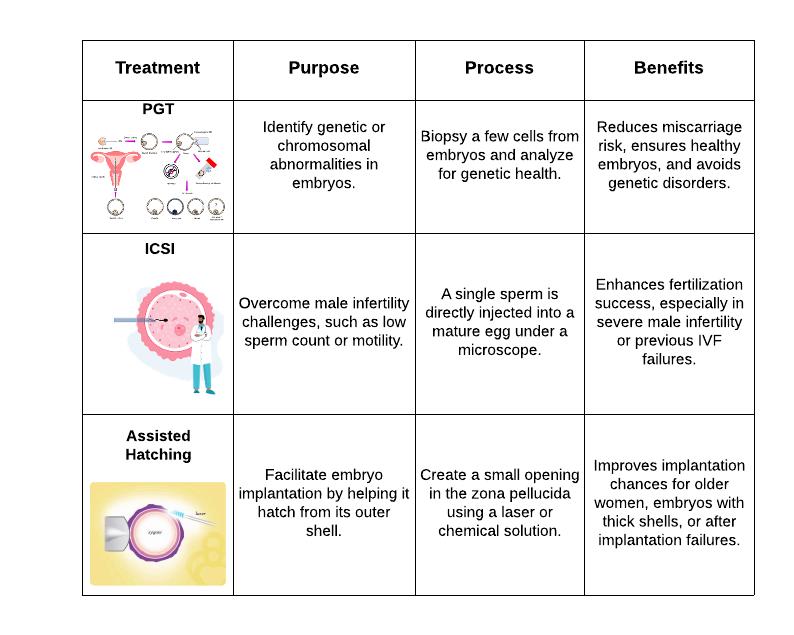
SUMMARY
Preimplantation genetic testing (PGT) detects genetic issues in embryos, reducing miscarriage risk. Intracytoplasmic sperm injection (ICSI) addresses male infertility. Assisted hatching helps embryos emerge, beneficial for older women, thicker shells, and past unsuccessful implantations.
To prepare for IVF treatment:
These steps will help you prepare physically, emotionally, and financially for IVF, enhancing your chances of success.
Consult a Specialist: Meet with a fertility specialist discuss your medical history and come up with a personalized treatment plan.
Get Necessary Tests: Carry out a semen analysis, ultrasounds, and blood tests to determine your reproductive health and come up with an appropriate IVF plan
Adopt a Healthy Lifestyle: Eat healthy, exercise regularly, avoid drug abuse, alcohol, smoking, etc.
Take Prescribed Medications: This can be achieved through a healthier lifestyle. Good eating habits, moderate exercise, and avoidance of drugs, alcohol, and smoking all contribute to improved fertility.
Take Prescribed Medications: A preparation for IVF includes taking the supplements or hormones prescribed by your physician.
Reduce Stress: To keep cool during the whole process, do your best with stress-reducing techniques like yoga, meditation, or therapy.
Plan Finances: For the financial aspect of the treatment, explore insurance or grants and research IVF costs.
Stay Educated: Learn more about the process of IVF so you can better prepare for every step and feel much more comfortable.
Arrange Emotional Support: Assemble an esteemed community of friends, family, or a counselor to help you cope with the emotional highs and lows of IVF.
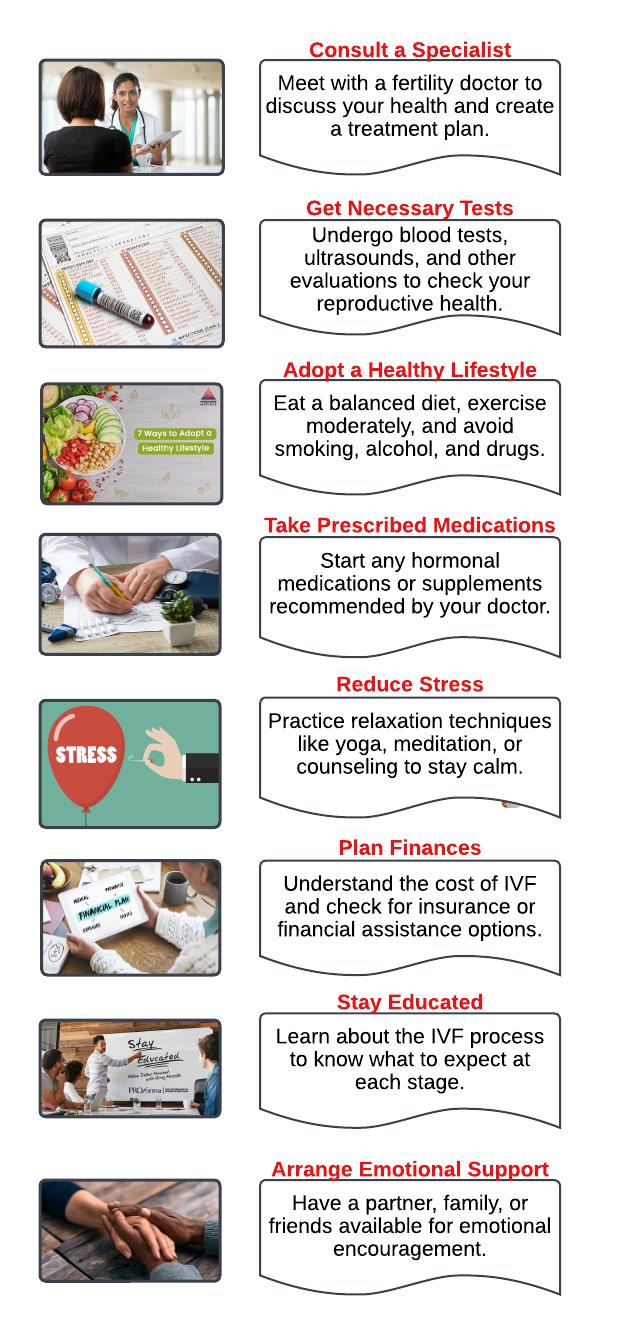
Mild Symptoms: One can experience bloating, light spotting, and mild cramping.
Emotional Ups and Downs: The emotional ups and downs will mainly arise from the stress of waiting and hormonal changes.
Activity Levels: Avoid strenuous exercise, stick to your doctor's advice, and engage in mild exercise.
Avoid Early Testing: Do not take the home pregnancy test until after your scheduled blood test has confirmed your pregnancy.
Listen to medical advice: Do whatever your doctor says about diet, exercise, and prescription medication.
Be Aware of Severe Symptoms: You should seek medical attention right away if you have severe pain, heavy bleeding, or any other abnormal symptoms.
Customized Experience: Because every person's IVF journey is unique, ask your healthcare team for what will work best for you.
SUMMARY
Mild symptoms include bloating, light spotting, and cramping. Emotional stress and hormonal changes cause emotional ups and downs. Mild activity is recommended and early testing. Follow the doctor's advice on food, exercise, and prescription drugs. Be aware of severe symptoms and consult your healthcare team for personalized support.
To support the preparation of the uterus, assist in early pregnancy, and cause the ovaries to help produce eggs, IVF mainly involves a combination of medications. Below is an overview of the drugs commonly used to administer IVF treatment
Here’s a table summarizing the medicines commonly used for IVF treatment:
|
Medication |
Purpose |
Common Examples |
|
Gonadotropins (FSH and LH) |
Stimulate ovaries to produce multiple eggs |
Follistim, Gonal-F, Menopur |
|
GnRH Agonists |
Prevent premature ovulation and control the timing of egg retrieval |
Lupron |
|
GnRH Antagonists |
Suppress premature ovulation during the stimulation phase |
Cetrotide, Antagon |
|
Estrogen |
Thicken the uterine lining for embryo implantation |
Estrace, Vivelle-Dot |
|
Progesterone |
Support uterine lining and early pregnancy after embryo transfer |
Crinone, Endometrin, Progesterone injections |
|
HCG (Trigger Shot) |
Trigger final maturation of eggs before egg retrieval |
Ovidrel, Pregnyl |
|
Aspirin (Low Dose) |
Improve blood flow to the uterus |
Low-dose aspirin |
|
Antibiotics |
Prevent infection before egg retrieval |
Various, prescribed as needed |
|
HCG Injections (Early Pregnancy) |
Support early pregnancy after embryo transfer |
Administered in small doses if needed |
IVF injections regulate and optimize the reproductive process in such a way that there is a high chance of conceiving a child. The injections for ovarian stimulation activate the ovaries to release more eggs by releasing the hormones FSH and LH. To make sure that the eggs are prepared for collection, ovulation suppression injections, either the GnRH agonist or antagonist, inhibit the early release of the eggs. Then the eggs will mature and be readied for collection with an injection of hCG. The final set of injections, however, is to prepare and support the uterine lining for embryo implantation and early pregnancy by injections of estrogen and progesterone. To make an IVF cycle work, the timing of each type of injection must be done in order and tailored to each client.
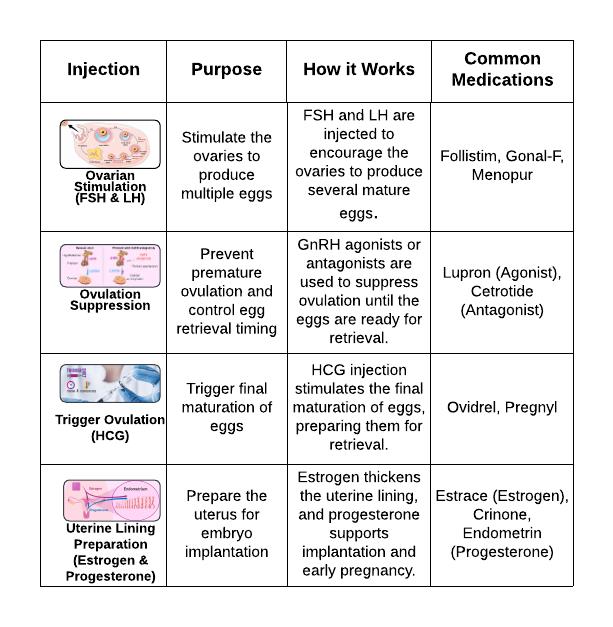
SUMMARY
IVF injections optimize the reproductive process to increase the possibility of conceiving. They stimulate the hormones FSH and LH in the ovaries, inhibit early egg release with GnRH agonists or antagonists, mature the eggs following with hCG injections, and develop the uterine lining with estrogen and progesterone injections.

The normal cost for the IVF procedure in Delhi, based on the clinic and other specific needs of the patient, can range between ₹ 1.2 lakh to ₹ 1.6 lakhs per cycle. Consultation fees, diagnostic tests, medication-assisted ovarian stimulation, blood and ultrasound monitoring, egg retrieval, laboratory procedures involved in fertilization and culture of embryos, and, finally, embryo transfer are included in this amount. Other costs could push the total cost, such as using donor eggs or sperm or advanced procedures like ICSI. To know the exact split and tailor the treatment plan to your needs, it is recommended that you consult a fertility specialist.
Tests and Scans cost for IVF in Delhi
| Test/Scan | Purpose | Cost (INR) |
| Hormonal tests | ||
| Anti-Mullerian Hormone (AMH) | Evaluates Ovarian reserve | INR 1,500-3,000 |
| Follicle Stimulating Hormone (FSH) | Assess ovarian function | INR 300-800 |
| Luteinizing Hormone (LH) | Tracks ovulation-related hormones | INR 300-800 |
| Estradiol | Monitors ovarian follicle development | INR 500-1,000 |
| Thyroid function Test (T3, T4, TSH) | Checks thyroid health (affects fertility) | INR 500-1,000 |
| Prolactin | Determines prolactin levels | INR 500-800 |
| Blood tests | ||
| Complete Blood Count (CBC) | Checks general health and infections | INR 300-500 |
| Blood grouping and Rh typing | The blood group of the patient is determined | INR 200-500 |
| HIV, HBsAg & HCV | Screens for sexually transmitted infections | INR 1,500-2,500 |
| Blood Sugar (Fasting/PP) | Ensures normal glucose levels | INR 200-500 |
| Imaging tests | ||
| Transvaginal Ultrasound | Monitors ovarian follicles and uterus condition | INR 1,000-3,000 |
| Pelvic Ultrasound | Assess uterine and ovarian health | INR 1,500-3000 |
| Male fertility tests | ||
| Semen analysis | Evaluate sperm count, motility, and morphology | INR 800-1,500 |
| DNA Fragmentation Index (DFI) | Checks sperm DNA integrity | INR 5,000-10,000 |
| Specialized Tests | ||
| Hysterosalpingography | Examines fallopian tubes and uterine cavity | INR 3,000-6,000 |
| Saline Sonography (SIS) | Visualizes uterine abnormalities | INR 3,000-5,000 |
| Karyotyping | Detects genetic abnormalities | INR 4,000-8,000 |
| Preimplantation Genetic Testing (PGT) | Screens embryos for genetic disorders | INR 50,000-1,00,000 |
| Others | ||
| Rubella IgG Antibodies Tests | To check the immunity | INR 800-1,500 |
| Vitamin D levels test | Checks for deficiencies affecting fertility | |
| Total cost | INR 78,000-1,57,000 | |
| COST BREAKDOWN OF THE IVF PROCESS | ||
| Aspects | Cost | Description |
| Initial Consultation | INR 5,000- INR10,000 | Meet a fertility specialist to discuss your needs and plan treatment. |
| Diagnostic Tests | INR 10,000- INR 15,000 | Tests like blood tests, ultrasounds, and semen analysis are performed to check fertility. |
| Ovarian Stimulation | INR 15,000- INR 20,000 | Medications are given to help ovaries produce multiple eggs. |
| Monitoring | INR 8,000- INR 10,000 | Regular check-ups with ultrasounds and blood tests are performed to track egg growth. |
| Egg Retrieval | INR 15,000- INR 18,000 | A minor retrieval process is performed to collect eggs from the ovaries. |
| Sperm Preparation | INR 8,000- INR12,000 | Sperms from the semen of the male are processed to prepare for fertilization. |
| Fertilization | INR 18,000- INR 25,000 | Eggs from the female and sperm from the male are combined in the lab to create embryos. |
| Embryo culture | Included in the fertilization cost | Embryos are grown in the lab for a few days. |
| Embryo transfer | INR 12,000- INR 18,000 | The best embryo(s) are placed into the uterus of the female. |
| Medications post-transfer | INR 8,000- INR 10,000 | Hormonal medications or injections are given to support the embryo after transfer. |
| Pregnancy tests | INR 1,000- INR2,000 | A blood test is being done to confirm the pregnancy after two weeks. |
| Cryopreservation (Optional) | INR10,000- INR 15,000 | Embryos are frozen for future use. |
| Total estimated cost for a standard IVF cycle | INR 1.2 lakh- INR 1.6 lakh | The overall cost for one standard IVF Cycle. |
| Add-On Service | Details | Approx. Cost (INR) |
| Freezing of Embryos | Preservation for future use | INR 20,000-40,000 |
| Freezing of Eggs/Sperm | Long-term Storage of reproductive cells | INR 10,000-20,000 |
| Laser-Assisted Hatching | Helps embryo implantation | INR 15,000-25,000 |
| Blastocyst Culture | Extended culture of embryos | INR 10,000-20,000 |
| Donor Sperm/Eggs | If required for treatment | INR 20,000-50,000 |
| Repeated embryo transfer | For transferring frozen embryos | INR 15,000-30,000 |
| ERA (Endometrial Receptivity Array) | For personalized embryo transfer timing | INR 25,000-35,000 |
| Additional Medication | For managing side effects or complications | INR 5,000-15,000 |
| Genetic Counseling | Guidance on genetic test results | INR 3,000-8,000 |
| Psychological support | To keep the intended parents stress-free throughout | INR 1,500-3,000 per session |
| The total add-on cost for IVF is- INR 80,000-3,00,000 | ||
IVF treatments and test tube baby operations are usually not covered through health insurance in India. Any diagnostic test may be reimbursed through some insurance companies in India. To cut costs, research services, look for discounts, opt for a closer clinic, explore the option of shared risk programs, loans, government-related programs, or crowdsourcing.

| Days | Stage | Description | Estimated Cost (INR) | Relevant Scans/Tests | Payment Timing |
| Day 1 | Initial Consultation and Diagnostics | -Consultation with a Fertility Specialist. -Tests and scans include, Blood Tests, Ultrasound, and Semen Analysis |
INR 10,000-INR 30,000 | -Transvaginal Ultrasound (TVS) - Blood Tests (AMH, FSH, LH, etc.) -Semen Analysis. |
Paid on the day of consultation |
| Day 6-10 | Ovarian Stimulation | Hormonal injections and medications to stimulate ovaries for egg production. |
INR 50,000-INR 80,000 | -Follicular Monitoring Ultrasound (TVS) - Blood Tests (Estradiol levels) |
Paid daily in installments per visit. |
| Day 11-14 | Ovarian Monitoring | Monitoring follicular development and hormone levels |
Included in the Stimulation Cost | -Multiple Follicular Monitoring -Estradiol and LH Levels |
Paid during each monitoring visit. |
| Day 15 | Trigger injection and Pre-Retrieval Tests | -Final injection to mature eggs -Infection Screening before retrieval |
INR 5,000-INR 10,000 | Pre-procedure blood Tests (HIV, Hepatitis, etc.) | Paid on the day of the Trigger Injection. |
| Day 17 | Egg Retrieval Procedure | Eggs are retrieved under Ultrasound guidance in a Minor Surgical procedure. | INR 60,000-INR 80,000 | -TVS Ultrasound for Egg Retrieval -Pre-Procedure Infection Screening | Paid before the egg retrieval procedure. |
| Day 18-20 | Fertilization And Embryology | Fertilization Via IVF/ICSI, followed by embryo culture, and monitoring. | INR 20,000-INR 30,000 | Embryology Lab Monitoring of embryos (No Scans/Tests are required) | Paid on the day of Fertilization |
| Day 21 | Embryo Transfer | Fertilized embryo is transferred to the uterus | INR 30,000-INR 50,000 | Endometrial Ultrasound to check uterine lining | Paid on the day of transfer |
| Day 22-24 | Cryopreservation (optional) |
Freezing of unused embryos for future use. | INR 20,000-INR 30,000 per year |
No Scans/Tests Required | Paid before freezing, if applicable |
| Day 22-30 | Post-Procedure Monitoring | Pregnancy Tests and hormone monitoring to confirm implantation success. | INR 10,000-INR 15,000 | -Early Pregnancy Ultrasound -Blood Tests (Beta-HCG, Progesterone) |
Paid during each follow-up visit. |
| Total= INR 2,00,000- 2,50,000 | |||||

| Test | Definition | Specimen | |
| Ovarian Reserve Testing |
Anti-Müllerian Hormone (AMH) Test | It analyses the amount of AMH, the hormone that shows how much egg supply is left. | Blood sample. |
| Follicle-stimulating hormone (FSH) Levels | It measures the level of FSH, which affects reproductive function. | Blood sample. | |
| Antral Follicle Count (AFC) |
Counts the number of small follicles, present in the ovaries to check the amount of eggs. | Pelvic ultrasound. | |
| Genetic Testing |
Karyotyping | Examines the chromosome structure to identify genetic abnormalities. | Blood sample or tissue sample. |
| Genetic Carrier Screening | Screens for carrier status of hereditary disorders. | Blood sample or saliva | |
| Hormonal Testing |
Thyroid Function Tests |
Measure thyroid hormone levels (for example TSH, T3, T4). | Blood sample. |
| Prolactin Levels |
Measures levels of prolactin, a hormone with relation to fertility and menstrual health. | Blood sample | |
| Estrogen and Progesterone Levels | Monitors levels of Estrogen and progesterone, key reproductive hormones. | Blood sample | |
| Infectious Disease Screening |
HIV, Hepatitis B & C, Syphilis | Screens for infectious diseases that may affect either the pregnancy or the surrogate. | Blood sample |
| Rubella and Cytomegalovirus (CMV) | Checks for immunity or active infection for prevention of congenital diseases in the baby. | Blood sample | |
| Pelvic Ultrasound | Transvaginal Ultrasound | Uses an ultrasound probe placed vaginally to view reproductive organs. | No physical specimen; imaging examination. |
| Test | Definition | |
| Analysis | Semen Analysis | This test measures sperm count, motility, and morphology for an assessment of fertility. |
| Genetic Testing |
Karyotyping | Detects chromosomal abnormalities |
| Genetic Carrier Screening | Determines the existence of hereditary genetic disorders. | |
| Infectious Disease Screening |
HIV, Hepatitis B & C, Syphilis | Determine infectious diseases that affect fertility or safety of pregnancy |
| Rubella and Cytomegalovirus (CMV) | Testing for immunity or active infection. | |
| Additional STD Screening (Chlamydia, Gonorrhea) | Identify sexually transmitted infections. | |
| Blood Type and Rh Factor | Determine blood type and Rh to determine compatibility in pregnancy. | |
| Hormonal Testing | Testosterone Levels | Testosterone levels are measured to check the state of reproductive features. |
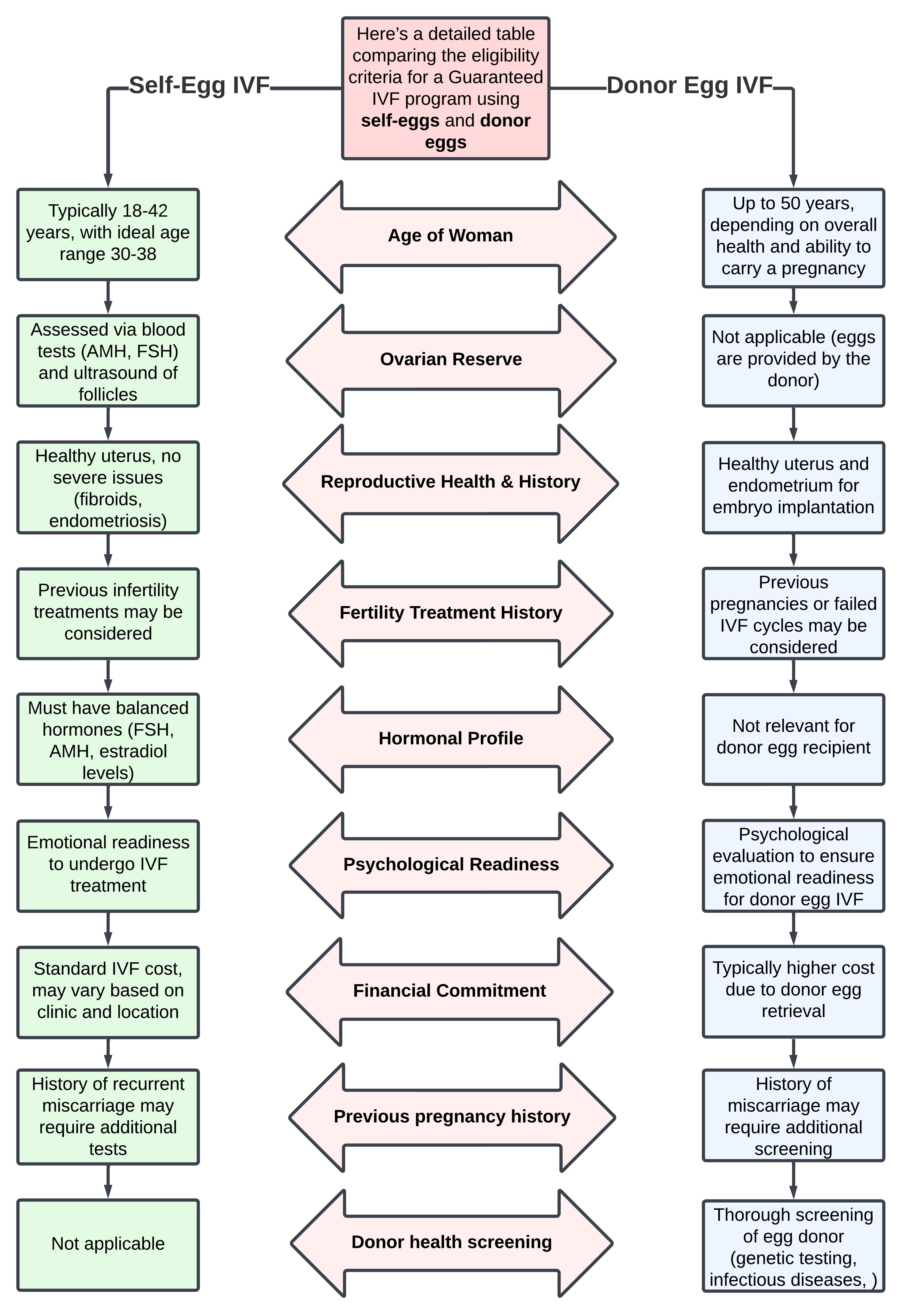

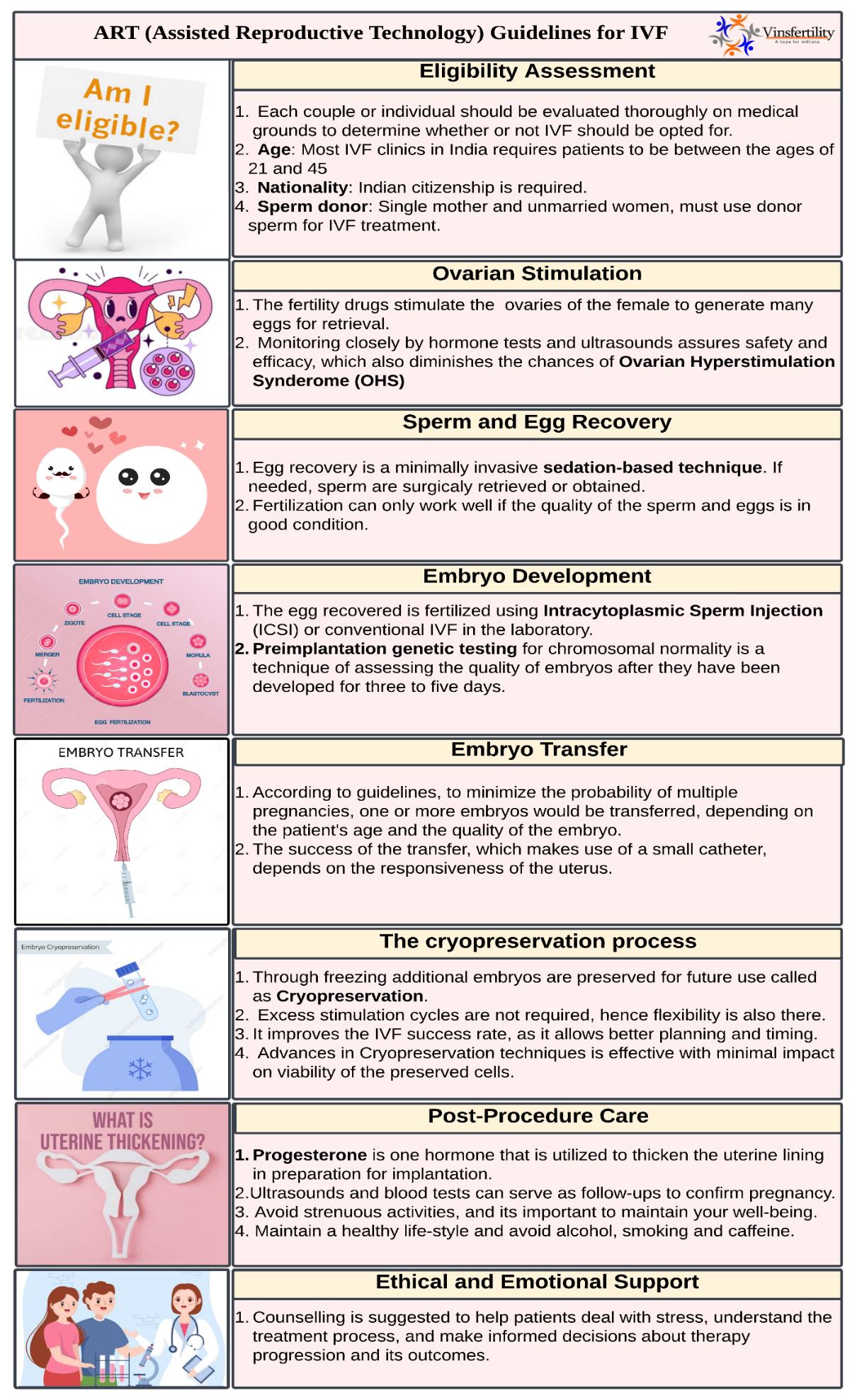

Dr. Sunita Singh Rathore is an obstetrician and Gynecologist working as a consultant at Vinsfertility Hospital New Delhi. She brings with her over 18 years of proven experience and is a name one can trust in reproductive medicine, boasting of her art in managing difficult fertility cases.
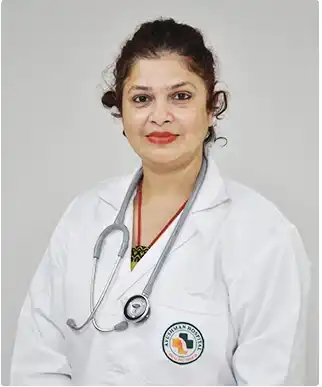
Gynecologist & IVF Specialist
Call us anytime
+91 8448879134


18+ Years of Expertise in Reproductive Medicine
Dr. Sunita Singh Rathore is known for empathetic and personalized treatment. Patients are taught knowledge, which is taken through risky pregnancies, advanced fertility treatments, and even the most complicated gynecological issues. Empathetic and an expert, she delivers excellent results, helping patients achieve health and the joy of parenthood.
Our team of specialists is dedicated and highly experienced in the field of reproductive health and surrogacy services.
We are committed to maintaining honesty and ethical standards at every stage of our surrogacy and fertility services.
Our clinic is equipped with state-of-the-art, high-tech facilities, delivering first-class care for all treatments related to infertility.
We provide complete support and assistance at every step of your path to parenthood.
Find answers to some of the most commonly asked questions about our services and surrogacy options.


In India, most health insurance plans do not cover IVF very often. However, there are some chances that IVF might be included in the rider of fertility treatment and sometimes diagnostic tests might be covered by the plan.
There is some discomfort related to IVF, particularly during the egg harvesting and ovarian stimulation phases. Pain is generally mild and manageable with medication, however.
A typical IVF cycle involves ovarian stimulation, egg retrieval, fertilization, embryo culture, and embryo transfer and takes about four to six weeks.
Some of them include ovarian hyperstimulation syndrome (OHSS), multiple pregnancies, infections, and mental stress. However, most women are left without significant issues.
We’re here to assist you on your journey. Feel free to reach out to us anytime!
We are available to answer your questions and provide support 24/7.
Behind BSES Rajdhani Power Station, Katwaria Sarai
Delhi 110016
India: +91 8448879134
USA: +1 9177308298
Australia: +61 29 0984857
UK: +44 121 7900588
info@vinsfertility.com
We are open 7 Days a Week
Mon - Sun | 24x7
Have questions? Fill out the form below, and we’ll get back to you as soon as possible.